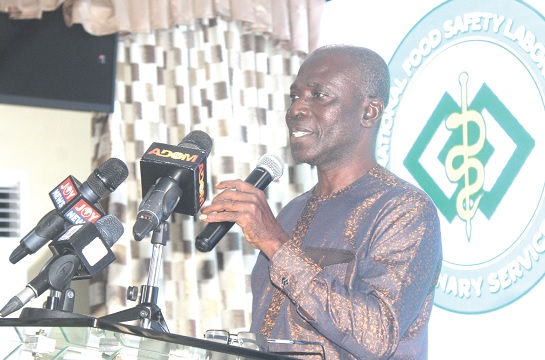Food security on the continent requires the collaboration of all actors across the food supply chain, robust governance, agreed international standards and harmonised regulations.
This will help improve the food safety systems in most countries on the continent, which were weak, fragmented and not well coordinated.
The Deputy Food and Agriculture Organisation (FAO) Regional Representative for Africa, Dr Yurdi Yasmi, who made the call, indicated that the current situation had left Africa with the highest per capita incidences of foodborne illness, according to the World Health Organisation (WHO).
The FAO Regional Representative for Africa said this in an address read on his behalf by the National Antimicrobial Project Coordinator, FAO Ghana, Dr Kofi Afakye, at this year’s World Food Safety Day in Accra.
The event was on the theme: “Food Standards, Save Lives”.
Sustainability
Dr Yasmi, who is also the FAO’s Country Representative for Ghana, said the systems were not effective enough to adequately protect the health of consumers.
He said to provide a sustainable and effective food safety system on the continent, some key principles and components were generally needed in each country.
He said they included National Food Safety Policy, as well as strong food regulatory and implementation strategies, and indicated that “we are proud of how far Ghana has come in this aspect”.
Dr Yasmi noted that food was a major determinant of health, nutritional status and the productivity of a population and that today it was produced and processed in greater volumes and distributed over greater distances than ever before.
“Food standards are a way of ensuring safety and quality.
They provide guidance on hygienic food handling for farmers and processors.
They define the maximum levels of additives, contaminants, residues of pesticides and veterinary drugs that can safely be consumed.
Resolution
Dr Yasmi indicated that the adoption of resolution 73/250 by the United Nations (UN) General Assembly to proclaim every June 7 as World Food Safety Day was from a well-thought initiative by the Codex Alimentarius Commission, which was based on recognition of the global situation where foodborne illnesses were engulfing mankind.
During a panel session on standards and regulations, the Head of the Foodborne Disease Surveillance at the Food and Drugs Authority (FDA), Benjamin Osei Tutu, said food safety was the assurance that food did not cause harm to a consumer.
He said the Public Health Act gave the FDA the mandate to ensure food safety in the country, adding that it also charged the authority to work through other state agencies and the district assemblies to ensure food safety.
The Deputy Director of the Plant Protection and Regulatory Services Division at the Ministry of Food and Agriculture, Patrick Beseh, said his outfit had a role to play from the source of production of food until it got to the table,
He said they took farmers through good agricultural practices to ensure that the food they produced was free of chemicals, among other things.
Regulation
Thus, he said the standards that were set were used to regulate food products in the country.
A veterinary technologist, Claude Otto, said the duty of the Veterinary Services Department was to ensure that the meat that got to the market was safe for consumption.
The meat, he said, must thus be free from microbial contamination, chemical contamination and physical contamination.
The work of the VSD, he said, did not just start with meat but the entire value chain of production starting from the farm.
The Head of Food, Chemistry and Materials Standards Department of the Ghana Standards Authority (GSA), Nana Pokuaa Asare-Twerefour, said the GSA was to ensure that there were standards to ensure food safety.
“Standards are basically used as a measure or a yardstick.
Technically, it is a document that contains requirements or specifications, which are based on scientific justification,” she said.

